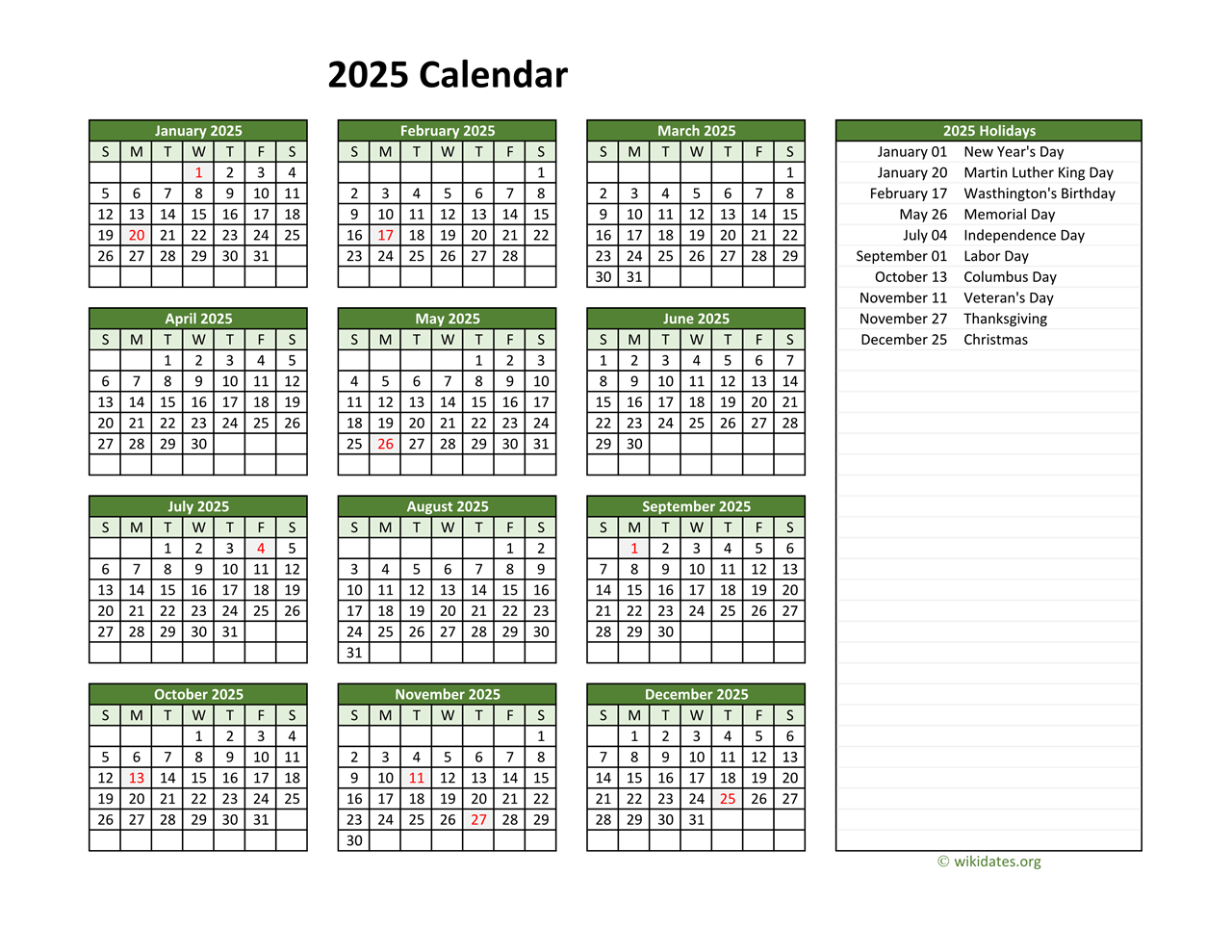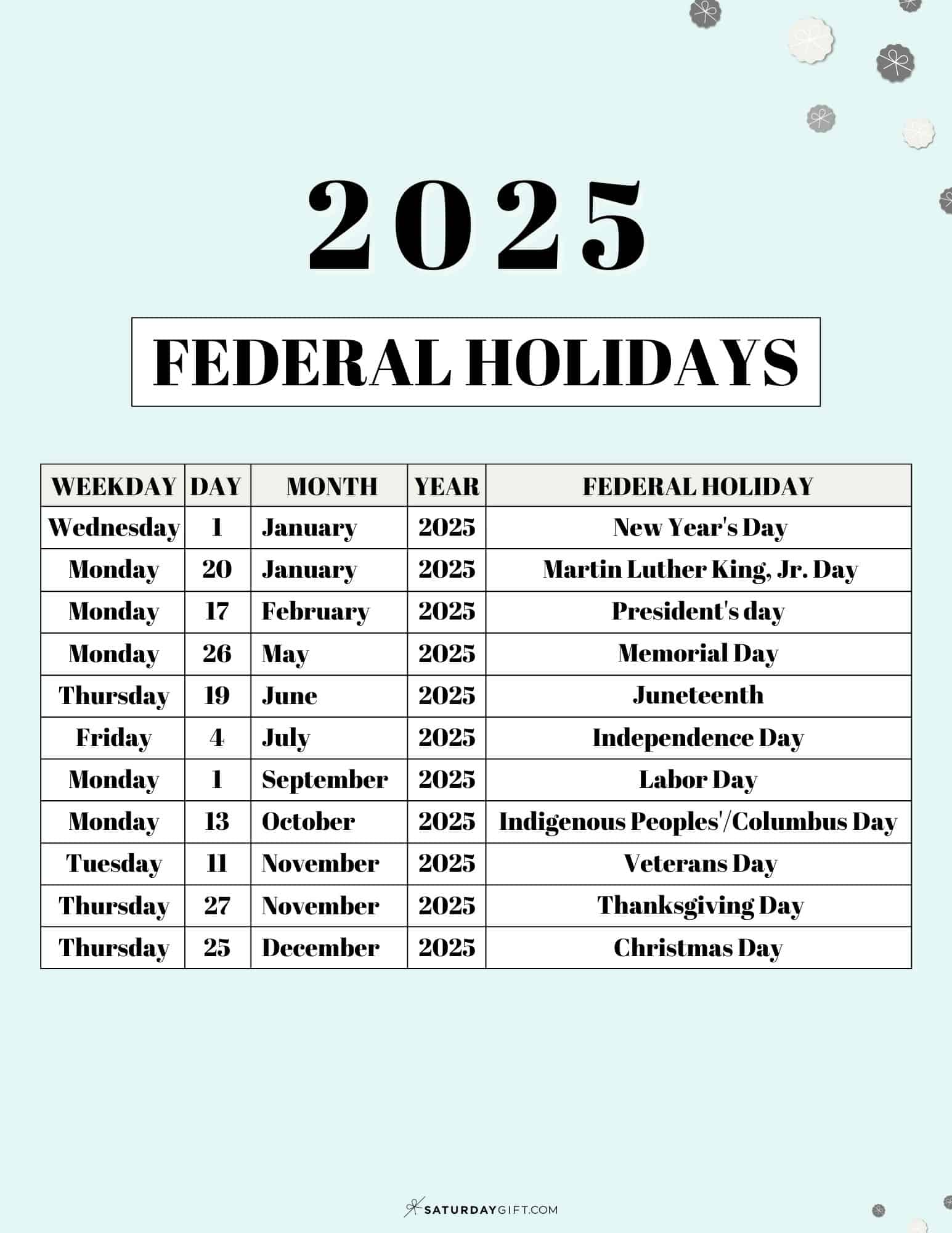Navigating the Federal Holiday Calendar: A Guide to 2025
Related Articles: Navigating the Federal Holiday Calendar: A Guide to 2025
Introduction
With enthusiasm, let’s navigate through the intriguing topic related to Navigating the Federal Holiday Calendar: A Guide to 2025. Let’s weave interesting information and offer fresh perspectives to the readers.
Table of Content
Navigating the Federal Holiday Calendar: A Guide to 2025

The federal government holiday calendar serves as a guide for observing days of national significance, offering a blend of historical commemoration, cultural celebration, and opportunities for rest and reflection. While these holidays may not affect everyone directly, they impact the functioning of government agencies, businesses, and financial institutions, shaping the rhythm of daily life for many. Understanding the nuances of these holidays is crucial for individuals and organizations alike.
The 2025 Federal Holiday Calendar: A Comprehensive Overview
The year 2025 presents a diverse array of federal holidays, each imbued with its own historical and cultural significance.
January:
- New Year’s Day (Wednesday, January 1): This holiday marks the beginning of a new year and provides a time for reflection, goal setting, and fresh starts.
- Martin Luther King, Jr. Day (Monday, January 20): Observed on the third Monday of January, this holiday honors the life and legacy of Dr. Martin Luther King, Jr., a pivotal figure in the Civil Rights Movement. It serves as a reminder of the ongoing fight for equality and justice.
February:
- Presidents’ Day (Monday, February 17): This holiday, celebrated on the third Monday of February, honors the birthdays of George Washington and Abraham Lincoln, two iconic figures in American history. It provides an opportunity to reflect on their contributions to the nation’s founding and development.
May:
- Memorial Day (Monday, May 26): This solemn holiday, observed on the last Monday of May, honors the sacrifices of those who died in military service to the United States. It is a day of remembrance and gratitude for their ultimate sacrifice.
June:
- Juneteenth National Independence Day (Friday, June 19): This relatively recent addition to the federal holiday calendar commemorates the emancipation of enslaved African Americans in the United States. It symbolizes the ongoing struggle for freedom and equality, and serves as a reminder of the nation’s complex history.
July:
- Independence Day (Wednesday, July 4): Celebrated on the 4th of July, this holiday commemorates the signing of the Declaration of Independence in 1776, marking the birth of the United States as an independent nation. It is a day of national pride and celebration, often marked by fireworks displays and patriotic gatherings.
October:
- Columbus Day (Monday, October 13): This holiday, observed on the second Monday of October, commemorates the arrival of Christopher Columbus in the Americas in 1492. While historically significant, it has become increasingly controversial due to its association with the colonization and exploitation of indigenous populations.
November:
- Veterans Day (Monday, November 10): This holiday, observed on the second Monday of November, honors all those who have served in the United States Armed Forces. It is a day to express gratitude for their service and sacrifice, both past and present.
- Thanksgiving Day (Thursday, November 27): This holiday, observed on the fourth Thursday of November, is a time for gratitude, feasting, and family gatherings. It commemorates the historical Thanksgiving feast shared by Pilgrims and Native Americans in 1621.
December:
- Christmas Day (Wednesday, December 25): This holiday celebrates the birth of Jesus Christ, a central figure in the Christian faith. It is a time for religious observance, family gatherings, and gift-giving.
Understanding the Impact of Federal Holidays
The impact of federal holidays extends beyond the individual level, influencing the operation of various sectors of society.
- Government Agencies: Federal government offices are closed on all federal holidays, impacting government services and operations.
- Businesses: While not mandated by law, many businesses choose to close or adjust their hours on federal holidays, impacting employee schedules and customer service.
- Financial Markets: Stock exchanges and banks are generally closed on federal holidays, impacting financial transactions and market activity.
- Education: Schools and universities often observe federal holidays, providing students and faculty with time off.
Frequently Asked Questions
1. Are all federal holidays observed by all states?
While the federal government designates these holidays, not all states observe them. Some states may have their own unique holidays or choose to observe federal holidays on different dates.
2. Are employees entitled to paid time off on federal holidays?
The entitlement to paid time off on federal holidays depends on individual employment contracts and state laws. Some employers may offer paid time off, while others may not.
3. Are federal holidays always observed on the same date each year?
Some federal holidays, like Independence Day and Christmas Day, are fixed on specific dates. Others, like Memorial Day and Veterans Day, are observed on specific days of the week within a month, making their dates vary from year to year.
4. What happens if a federal holiday falls on a weekend?
If a federal holiday falls on a Saturday or Sunday, it is generally not observed on another day. However, some states may choose to observe the holiday on a different day, often the preceding Friday or the following Monday.
5. What are the origins of the different federal holidays?
Each federal holiday has a unique historical or cultural origin, often commemorating significant events or individuals. It is important to research the individual history of each holiday to gain a deeper understanding of its significance.
Tips for Planning Around Federal Holidays
- Plan ahead: Be aware of federal holiday dates and their potential impact on your work, travel, or personal plans.
- Check business hours: Confirm the operating hours of businesses, government agencies, and financial institutions during federal holidays.
- Make travel arrangements in advance: If traveling during a federal holiday, book flights, hotels, and other travel arrangements well ahead of time.
- Be mindful of postal service disruptions: Mail delivery may be affected during federal holidays, so plan accordingly.
- Take advantage of opportunities for reflection and celebration: Federal holidays provide opportunities for reflection on national values, cultural heritage, and historical events.
Conclusion
The federal holiday calendar provides a valuable framework for understanding and celebrating significant events in the nation’s history and culture. It offers a blend of historical commemoration, cultural celebration, and opportunities for rest and reflection, impacting various aspects of daily life. By understanding the nuances of these holidays, individuals and organizations can effectively navigate the calendar and plan their activities accordingly, ensuring a smooth and productive experience.








Closure
Thus, we hope this article has provided valuable insights into Navigating the Federal Holiday Calendar: A Guide to 2025. We thank you for taking the time to read this article. See you in our next article!
